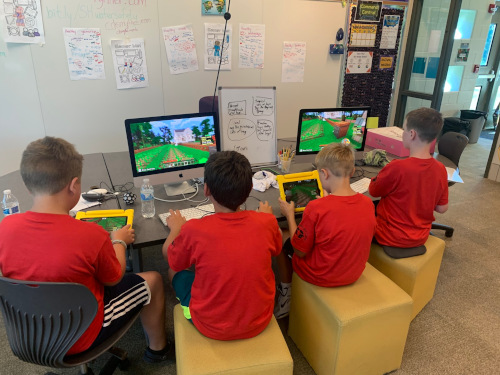
The benefits of esports are well documented. A significant body of research has found that students who participate in scholastic esports programs benefit from increased emotional regulation, academic achievement, and graduation rates.
These benefits only scratch the surface of the positive consequences for students participating in scholastic esports. Thus far, conversations around esports have centered on collegiate and secondary levels, however, a recent change in the winds has shifted the conversation to elementary esports.
My question: Why haven’t we started this conversation sooner?
I’ve come a long way in my journey from a skeptic with a critical view of esports in schools to a fierce advocate. In one year, I shifted from being an educator who didn’t value an expanded role of video games in schools to a teacher developing an elementary esports curriculum, running multiple esports summer camps, and developing an elementary esports after school club.
I teach an elementary STEM class called iCreate in South Haven Public Schools. We are a small community located on the “sunset coast” of Lake Michigan. Our economy is driven by tourism and agriculture. Nestled in Michigan’s fruit belt, South Haven is the Blueberry Capital of the world. Our small community hosts the National Blueberry Festival every year and countless high school students work the local u-pick blueberry fields.
My STEM class, iCreate, is a part of our K-12 STEM continuum. In iCreate, students develop problem-solving skills through engineering challenges, collaborative inquiry projects, and media creation. While I have long been a proponent of game-based learning, I had (up until this past year) been skeptical of the role of esports in education.
Summer 2021: Farmcraft Summer Camp
As the summer of 2021 approached, the faculty at South Haven Public Schools was tackling the best way to address pandemic learning loss while keeping students connected to the one stable thing in their lives: school. An invitation for teachers to design and lead summer enrichment camps seemed like a good way to connect with students in a manner not afforded during the regular school year. I could design a camp without worrying about standards alignment, summative assessments, or grades.
After a year of remote and hybrid learning, leading a camp with any sort of technology was the LAST thing on my mind. In fact, I wanted to lead a camp about gardening, one of my favorite summer pastimes, but how do you get 10- and 11-year-old students to sign up for a camp about plants?
Enter NASEF’s Farmcraft 2021.
Our local esports league commissioner mentioned that the North America Scholastic Esports Federation had released a Minecraft world for esports competition called Farmcraft. The mission: work collaboratively to successfully farm in different biomes. While many of our community’s families rely on local farms for their livelihood, students understand very little about agriculture. Farmcraft would provide the perfect opportunity to draw students into a science camp; competitive video game play would interest students, and discussing healthy gaming habits would interest their grown-ups. Added bonus: I would have plenty of opportunities to get dirty planting and exploring farming with my students.
I organized my summer camp around three key concepts: healthy gamer habits, farming around the world, and the life cycle of plants. Every day, we explored plants through hands-on experiments, farmed in Minecraft, and stayed active with recess breaks.
On the last day of camp, the head of the SWMI Esports League, a NASEF affiliate, joined us to oversee a friendly scrimmage. Students received team jerseys that were custom designed for the camp: shirts with our summer camp logo representing healthy bodies, healthy minds, healthy relationships, Farmcraft.
Tip 1: Get started, then get better
Like any new venture, esports is something that takes time to fully understand. As the late Dr. Richard DuFour reminded educators, we have to be willing to “get started, then get better.” The beauty of esports is that there is a room full of experts to journey alongside their teacher. It is incredibly powerful when the classroom is flipped and students have an opportunity to share their passions and expertise with their teacher.

